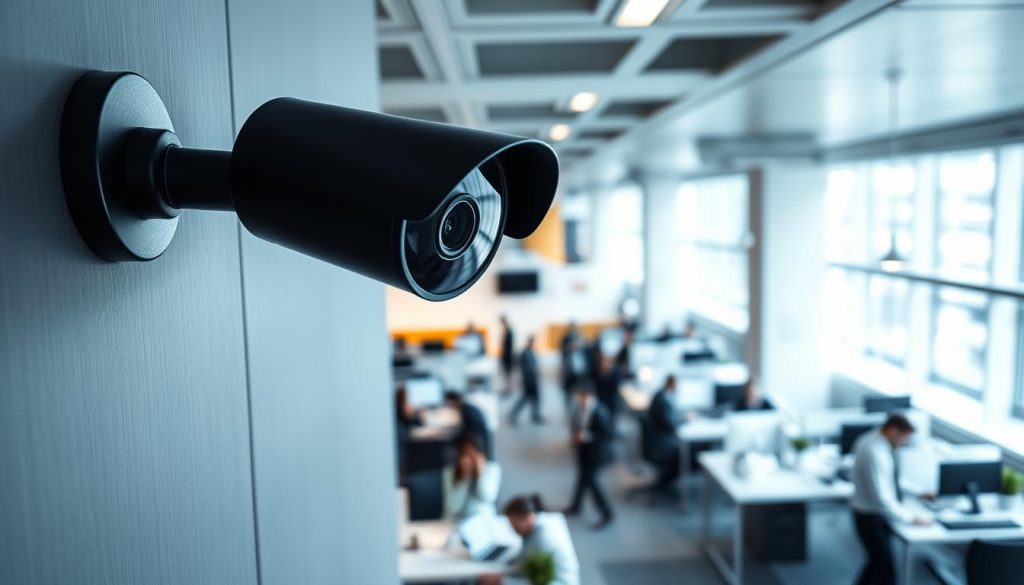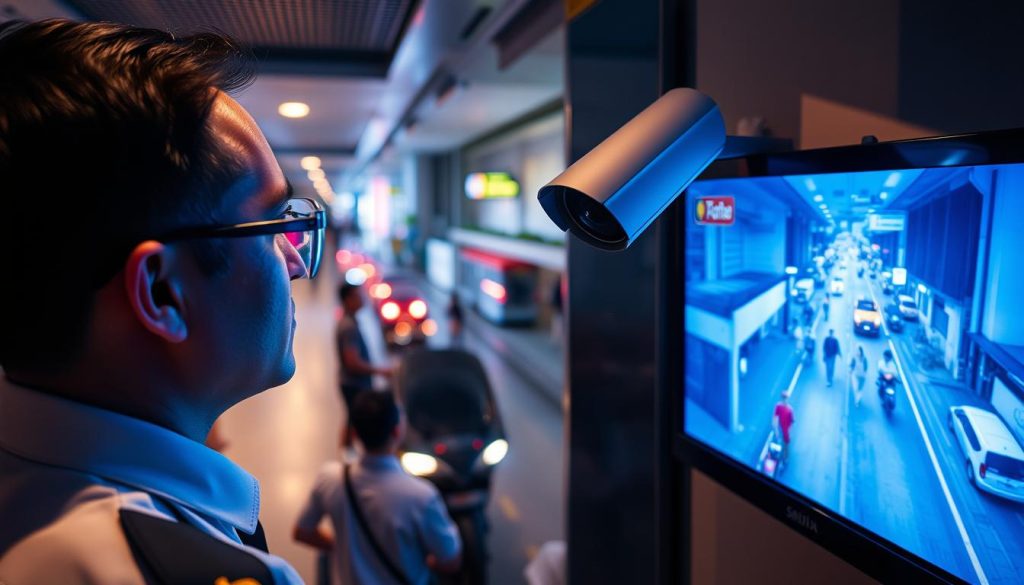In Singapore, who can see CCTV footage is clear. The rules are set to protect your privacy. The Personal Data Protection Act (PDPA) says only certain people can look at these recordings.
These include property owners and those with permission. The goal is to keep everyone safe while also keeping your personal info private.
Key Takeaways
- Access to CCTV footage is regulated by Singapore’s legal landscape.
- The Personal Data Protection Act (PDPA) plays a critical role in governing footage access.
- CCTV footage access is limited to property owners and authorized personnel.
- Data privacy is prioritized to protect individuals captured in footage.
- Understanding CCTV regulations is essential for compliance and accountability.
Understanding the Legal Landscape of CCTV Footage in Singapore
In Singapore, CCTV use is guided by a detailed CCTV legal framework. This framework balances individual rights with the need for surveillance for safety. It includes Singapore surveillance laws that specify how cameras can be installed and monitored.
The Personal Data Protection Act (PDPA) is key to these rules. It requires strict adherence to data protection regulations. The goal is to make sure CCTV footage is handled with care, respecting people’s privacy. Breaking these rules, like unauthorized surveillance, can result in big fines.
For both businesses and individuals, knowing the laws about CCTV is essential. This knowledge helps ensure responsible use and keeps public trust in surveillance systems.
The Role of the Personal Data Protection Act (PDPA)
The Personal Data Protection Act (PDPA) in Singapore is key to personal data protection. It sets rules for how companies use personal data, like what CCTV systems capture. The PDPA says companies need to get people’s okay before they can use their data. This makes sure people have control over their own info.
CCTV footage can have personal data, so it falls under the PDPA. People can ask to see footage of themselves. This shows respect for their privacy and makes surveillance more open.
Companies need to watch their use of CCTV while keeping people’s privacy. The PDPA gives them clear rules to follow. Knowing these rules is important for both businesses and people whose data is recorded.
Following the PDPA means CCTV data is used the right way. Companies should check their policies to make sure they follow these rules. For more on CCTV footage rules, check out this resource.
Who can view CCTV footage Singapore?
In Singapore, knowing who can see CCTV footage is key. It’s about understanding personal rights and how to ask for footage. People have the right to see their own data in recordings. This is done to keep things fair and private.
Rights of the Individual
People in Singapore can ask to see CCTV footage with their personal data. This follows the rules of Singapore data access. They must have a good reason for their request.
Also, the ones who own the CCTV systems must handle these requests well. They must follow the law.
Requests for Footage
The footage request process has clear steps. You need to ask the right place for the footage. You might need to explain why you want it.
It’s important for places to hide personal info of others in the footage. This keeps everyone’s privacy safe while following the law.
Responsibilities of CCTV System Owners
In Singapore, CCTV owners have many duties to protect privacy and follow the law. They must manage data well. This means installing cameras in the right spots and using footage only for security and surveillance.
Following the law is key for CCTV operators. They must stick to rules like the Personal Data Protection Act (PDPA). This law requires them to be clear about how they handle personal data. If they don’t, they could face big fines.
Keeping cameras in good shape and watching them closely is also important. This helps owners avoid legal problems. It shows how careful management is key for both security and staying legal.
Private Property vs Public Spaces
In Singapore, CCTV systems have different rules for private and public areas. Homeowners have more freedom to set up cameras on their property. They must follow privacy laws to respect those around them. Knowing these rules helps keep security high while following the law.
Regulations for Residential Areas
At home, CCTV rules focus on privacy. Homeowners can put up cameras but must keep privacy in mind. Recently, HDB residents can install CCTV in corridors without needing permission first. This change helps keep homes safe while also valuing neighbor privacy.
CCTV Footage Access in Commercial Settings
Commercial places have rules for using CCTV cameras. These rules help follow local laws. Companies must tell employees when they are being watched.
Notification Requirements for Employees
Businesses need to tell workers about CCTV cameras. They should explain why these cameras are there. This makes sure everyone knows they are being watched.
Employees have rights under the Personal Data Protection Act (PDPA). They can ask to see their CCTV footage. This makes the workplace safer and respects employee privacy.

Privacy Concerns Surrounding CCTV Usage
CCTV systems are becoming more common in Singapore, raising big privacy issues CCTV. These tools help keep us safe but also raise data protection concerns. It’s a tough balance between keeping people safe and respecting their privacy.
Property owners and businesses need to follow the rules to handle these issues. Cameras should be placed carefully, avoiding places where people might feel uncomfortable. This helps build trust and makes everyone feel safer.
Requesting CCTV Footage: The Process
To get CCTV footage, you must follow a set process in Singapore. This ensures everyone knows what to do. It also helps organizations decide if a request is valid.
They can say no to requests that are not serious. This keeps the process fair and open.
Fees and Charges
When you ask for CCTV footage, you might have to pay a fee. The cost is usually fair and told to you before they start. This way, everyone knows what to expect.
It helps the organization cover their costs. Knowing about these fees is important if you want to see CCTV footage in Singapore.
Understanding the Implications of Unauthorized Access to CCTV Footage
Unauthorized access to CCTV footage in Singapore has big legal consequences. It can lead to heavy fines and even criminal charges. This shows why strict rules are needed for who can see the footage and when.
Unauthorized access to CCTV footage can also damage trust in surveillance systems. If people feel their privacy is not protected, they might not want surveillance cameras. This could make everyone worry more about safety and data protection.
To stop unauthorized access to CCTV, companies must have strong security measures. They should use encryption, keep an access log, and train staff regularly. This way, they follow the law and show they care about privacy.

